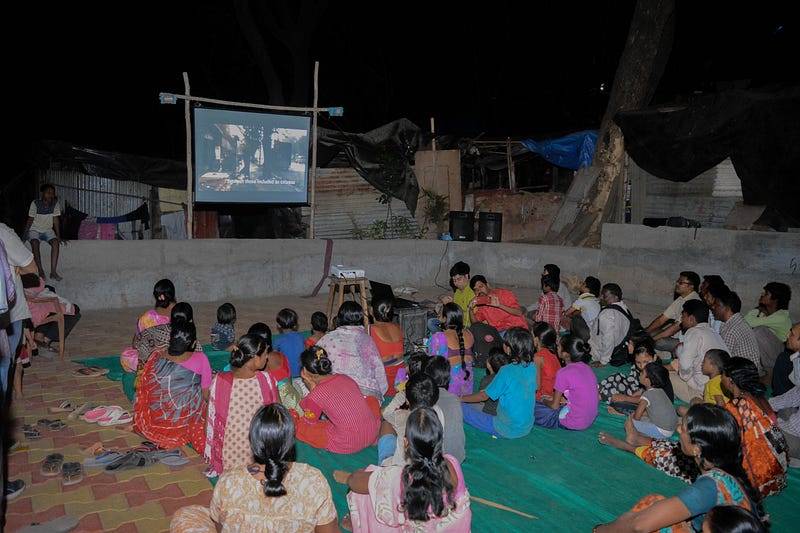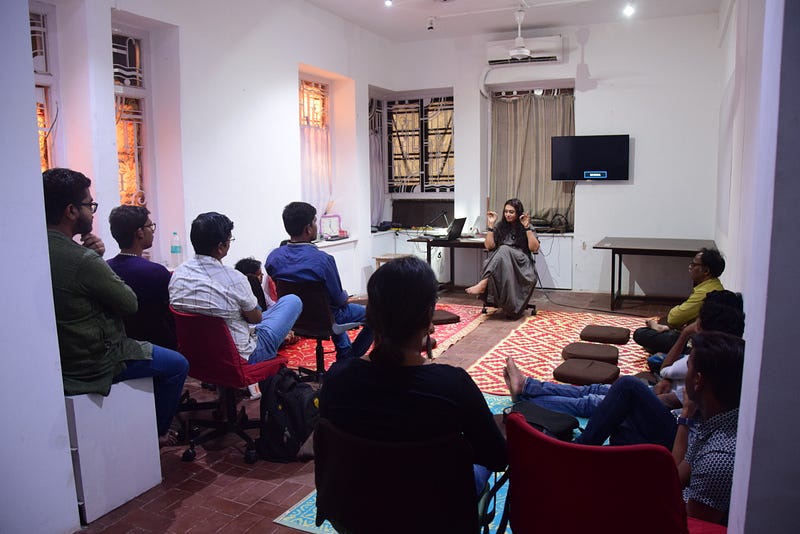Experiencing the Living Mumbai film festival

Indian cinema is famous worldwide. Hundreds of films release each year. Films are said to be a mirror to society. Yet, those at the centre of the experience depicted are often not a part of the filming process as such (especially if they are from marginalised communities). Film festivals also tend to be organised for elite audiences, leaving the narrative originators behind.
To address these disparities and promote interaction on urban films, YUVA organised the Living Mumbai film festival, in partnership with Centre for Education and Documentation (CED), Colaba, and Blue Ribbon Movement during ComplexCity week. The sites for the film festival were three community locations across Mumbai and Navi Mumbai, with the finale screening at CED. Films screened were on issues the community would be familiar with, to promote interactions and discussions post screening.
Wondering how the festival unfolded? We’re bringing you a first-hand account.
This Film is about My Life
Jai Durgamata Nagar in Belapur, Navi Mumbai, looks picturesque in the evening. As the sun sets between the hills, the excitement and anticipation among the men, women, children and youth is palpable. A film festival is being organised here for the first time. Slowly the courtyard starts filling up. At first, there are just a few people, but soon 110 community members are gathered.
Like Dust We Rise, the film screened here, is about those who clean the city of Mumbai, the Bombay Municipal Corporation workers. This is a profession many in the community are familiar with, having worked in a similar capacity. In the first scene, a cleaner speaks about the discrimination he faces. He keeps the city clean, yet is looked down upon. As the film progresses, people’s facial expressions change; they are following the scenes closely. Once it ends the mood is mixed. People seem eager to talk but quite hesitant; perhaps they are not sure how to start, or how freely they should talk.
Luckily, 60-year-old Ganesh Bhai takes the discussion forward. ‘I have experienced discrimination as a cleaner too. We must fight for our rights’, he says. He is angry that those who sweep the city daily receive meagre wages and exist on the peripheries, while others venture out with a broom in hand for a day for promotional purposes and receive media coverage. Another woman adds that though people often say there is no discrimination in cities, after watching this film her fears are reinforced. There is considerable fury on watching one scene in the film where the doctor refuses to treat an injured worker or even touch his feet. An elderly lady sums up what the film has meant to her in crisp words. Rising slowly from her seat she says, ‘This film is about my life’.
Why Should Boys only Play?
Under the Open Sky (Khule Aasmaan Ke Neeche) is screened at Lallubhai Compound’s Lal Maidan. The film is grounded in the question of girls’ right to play, and uses this premise to discuss other discrimination meted out to girls.
In this rehabilitation and resettlement (R&R) site, surrounded by tall buildings on each side, boys are frequently seen playing. After seeing the film though, community members start thinking and questioning why girls are not offered similar freedoms. ‘We don’t have a separate field where girls can play and families are often not comfortable with girls playing in the same space as boys’, says a community member. Girls in the community also started discussing their interest in sports and lack of avenues to explore this. ‘We hear of beti bachao beti padhao, but what about our right to play? Physical development is as important as academic knowledge’, says Deepa, a junior college student. Her friend Saurabh agrees with her, adding that there should be no discrimination between girls and boys in sports. Saraswati, another youth of Lallubhai Compound, believes that guardians should have faith in girls and encourage them to play. Parents and their daughters seem most interested in the discussions, and it seems as though some of them are talking about these issues for the first time.
Our Needs in the City should be Met
The last stop within the community for the film festival is at Ambujwadi in Malad. This community faces several infrastructure issues, and basic services are severely lacking. The film showcased here is Making Mumbai, which explores the concept of developing inclusive cities with the participatory approach of all, especially the youth. The mood of this film screening is a little different, as it is located at a busy square and people engage with us as they go about their daily chores. Asif, a daily wage worker, says that he likes the fact that others in the city too are thinking of inclusivity. An elderly representative of the community mentions the water shortage faced. ‘We are always striving to improve our livelihood possibilities, but how can we work if there is no water in the toilets. Basic services should be in place first’.
The Finale

At CED, the community film festival was reviewed with a fresh audience, mostly comprising film enthusiasts. Student films were showcased, with Chief Guest Insia Dariwala discussing her journey into film making, her socially impactful films, and how narratives can power societies. She discussed how the visual medium helps people instantly connect, the way it sparks a dialogue and the impact it can create on society. ‘I am sharing my struggles with you all so that you can be inspired by it, and ensure that the rich narratives you carry with you receive expression’, she said.
Translated from the original in Hindi by Blog Editor.


